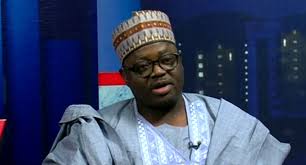Nigeria
NOA Chief Warns Poverty May Rise with Return of Petrol Subsidy

NOA Boss warns that poverty will worsen if the petrol subsidy is reinstated. Learn about the potential impacts of this policy decision.
Making an emotional appeal is how the ex-APC representative characterizes those who are calling for the reinstatement of petrol subsidies.
On Wednesday, Lanre Issa-Onilu – the Director-General of the National Orientation Agency (NOA) – requested that Nigerians develop plans to sustain themselves during this period amidst economic repercussions resulting from President Bola Tinubu’s administration removing petrol subsidies.
According to Issa-Onilu, a former spokesperson for the ruling All Progressives Congress (APC), if petrol subsidy is reinstated as demanded by #EndBadGovernance protesters over the past week, poverty will escalate.
Issa-Onilu stated on Channels Television’s Sunrise Daily breakfast show that calling for the reinstatement of subsidies is an emotional plea rather than an economic one. He further argues that proponents must demonstrate its potential to alleviate poverty, which it cannot accomplish but instead exacerbate if implemented.
Our focus should be on figuring out how to thrive without the subsidy. We must amplify the government’s actions towards enabling our survival in its absence.
He acknowledged the lack of trust between leaders and citizens in the nation, which has resulted from numerous instances of unfulfilled pledges over time.
Issa-Onilu spoke to information managers and acknowledged that it is a challenge to communicate with people who have been disappointed for many years. He stated that Nigerians feel discouraged, leading them to question the possibility of promises being fulfilled. Therefore, he emphasized the need for this administration to demonstrate its commitment in upholding their pledges so as not lose credibility among citizens.
Necessary But Painful
President Bola Tinubu has categorically dismissed the possibility of reintroducing subsidy on Premium Motor Spirit (PMS), also known as petrol, during Sunday’s discussion.
After days of unceasing #EndBadGovernance protests nationwide and with an audience that reached 200 million Nigerians, the President announced that he had made a difficult but crucial decision for economic reforms in removing petrol subsidies.
Young Nigerians who have been protesting since Thursday demanding an end to the country’s economic woes, have expressly called for a reinstatement of petrol and electricity subsidies.
Is the subsidy returning?
Nigeria, the largest country in Africa by its population size, encounters energy difficulties due to all of its government-owned oil refineries being non-functional. The nation heavily depends on imported petroleum products that are already refined while their state-run organization NNPC serves as the principal importer of such necessary commodities.
It has become routine to witness long lines of vehicles waiting for fuel in Nigeria as the cost of petrol skyrocketed threefold following the discontinuation of government subsidies in May 2023. The current rate is around N700 per litre, up from about N200/litre, adding more challenges to citizens who rely on petrol not only for their automobiles but also generators due to inconsistent power supply over many years.
The government merged forex exchange markets, resulting in the naira’s value plummeting from $1/N700 to beyond $1/1600 on the black market. Subsequently, there was a surge in prices of essential goods and groceries due to inflation causing hardship for Nigerians.
Due to the forex crisis plaguing the economy, oil marketers have revealed that it now costs over N1,000 per litre of imported petrol. However, petroleum products are still being sold for around N700 in different regions across the country, indicating a price difference which is presumably covered by government subsidies.
In July, the leader of the labor union, Joe Ajaero announced that workers had agreed to a N70,000 minimum wage and refused President Bola Tinubu’s proposal for a N250 000 minimum wage subject to increased fuel prices which would reintroduce subsidy.
According to both the World Bank and Robert Dickerman, CEO and Managing Director of Pinnacle Oil and Gas Limited, the Federal Government is continuing to provide subsidy for this product.
Femi Falana, a lawyer specializing in human rights, has urged the Federal Government to swiftly clarify or refute claims of fuel imports from foreign nations and put an end to any ambiguity.
The NNPC, which is under state control, has repeatedly stated that the subsidy on gasoline has been fully eliminated.
